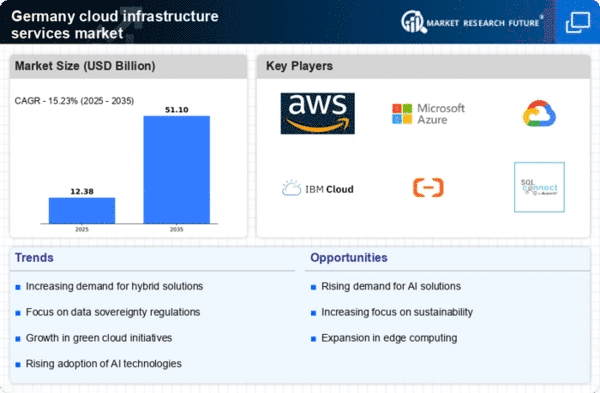Increased Focus on Sustainability
Sustainability has emerged as a critical driver in the cloud infrastructure-services market in Germany. Organizations are increasingly aware of their environmental impact and are seeking cloud solutions that align with their sustainability goals. This shift is reflected in the growing number of companies committing to carbon neutrality and energy-efficient practices. Recent statistics indicate that around 60% of German businesses are actively pursuing green cloud initiatives. Consequently, cloud service providers are adapting their infrastructures to offer more energy-efficient solutions, which not only meet regulatory requirements but also appeal to environmentally conscious consumers. This focus on sustainability is expected to shape the future landscape of the cloud infrastructure-services market.
Growing Demand for Scalable Solutions
The cloud infrastructure-services market in Germany is experiencing a notable surge in demand for scalable solutions. Businesses are increasingly seeking flexible cloud services that can adapt to their evolving needs. This trend is driven by the necessity for organizations to manage fluctuating workloads efficiently. According to recent data, approximately 70% of enterprises in Germany are prioritizing scalability in their cloud strategies. This growing demand is prompting cloud service providers to enhance their offerings, ensuring that they can accommodate varying levels of resource consumption. As a result, the cloud infrastructure-services market is likely to witness significant growth, as companies invest in scalable solutions to remain competitive in a dynamic business environment.
Rising Demand for Remote Work Solutions
The cloud infrastructure-services market in Germany is witnessing a rising demand for remote work solutions. As organizations increasingly adopt flexible work arrangements, the need for reliable cloud services that support remote collaboration has intensified. Recent data suggests that approximately 80% of German companies are investing in cloud-based tools to facilitate remote work. This trend is prompting cloud service providers to enhance their offerings, ensuring that they can deliver seamless connectivity and collaboration tools. Consequently, the cloud infrastructure-services market is likely to experience robust growth as businesses prioritize solutions that enable effective remote work environments.
Regulatory Compliance and Data Sovereignty
The cloud infrastructure-services market in Germany is significantly influenced by regulatory compliance and data sovereignty concerns. With stringent data protection laws, such as the General Data Protection Regulation (GDPR), organizations are compelled to ensure that their cloud services comply with local regulations. Approximately 75% of German companies report that compliance with data protection laws is a top priority when selecting cloud providers. This emphasis on regulatory adherence is driving the demand for cloud solutions that guarantee data sovereignty, prompting service providers to establish local data centers. As a result, the cloud infrastructure-services market is likely to expand as businesses seek compliant solutions that protect sensitive information.
Technological Advancements in Cloud Services
Technological advancements are playing a pivotal role in shaping the cloud infrastructure-services market in Germany. Innovations such as artificial intelligence (AI), machine learning (ML), and automation are enhancing the capabilities of cloud services. These technologies enable businesses to optimize their operations, improve efficiency, and reduce costs. Recent surveys indicate that over 65% of German enterprises are investing in AI-driven cloud solutions to gain a competitive edge. As these technologies continue to evolve, they are expected to drive further growth in the cloud infrastructure-services market, as organizations leverage advanced tools to enhance their cloud strategies.
















